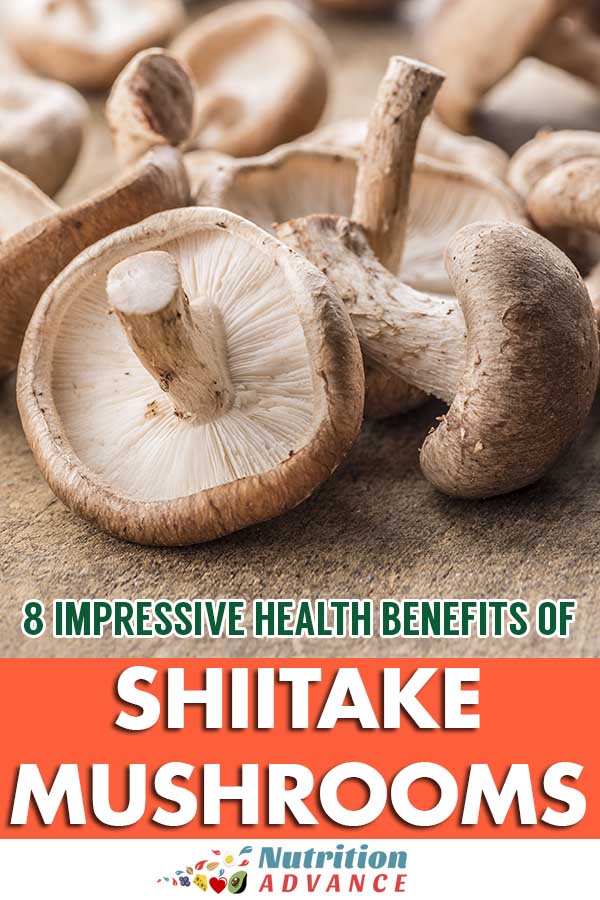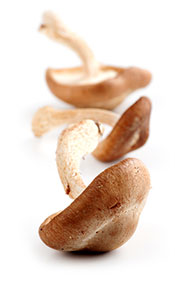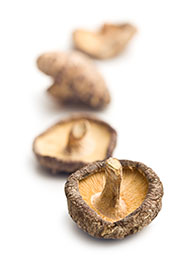
These edible mushrooms have a decent nutritional profile and contain some beneficial compounds.
Added to that, shiitake mushrooms taste delicious too. With a meaty and flavorful taste, they work well in a wide range of dishes.
This article examines the full nutrition profile and some potential benefits of shiitake mushrooms.
What Are Shiitake Mushrooms?
Pronounced ‘She-takki,’ Shiitake mushrooms (Lentinula edodes) are native to East Asia and they enjoy popularity in China, Japan, and Korea.
Long considered a medicinal mushroom due to their health-promoting compounds, shiitake mushrooms have featured in traditional Eastern medicine for hundreds of years.
Despite their traditional roots, commercial production of shiitake mushrooms now occurs all around the world.
In their whole food form, we can buy shiitake mushrooms either fresh or dried.
Shiitake mushrooms offer a lot nutritionally, and they provide a wide range of nutrients. The tables below show the nutritional values for both the fresh (cooked) and dried forms per 100 grams (1, 2). As shown above, the dried mushrooms are much denser in calories and carbohydrates. Fresh shiitake mushrooms contain 14.4 grams of carbohydrate, as well as small amounts of fat and protein. Shiitake mushrooms supply a decent source of B vitamins. The vitamin D content will depend on how much sun exposure the mushrooms had during their growth. Here is an overview of the potential benefits. According to a recent trial, long-term intake of shiitake mushrooms may have a beneficial effect on the immune system. In a randomized, dietary intervention, fifty-two healthy people consumed either 5 or 10 grams of dried shiitake mushrooms every day for four weeks. Before and after the trial, the researchers drew blood samples, and the results demonstrated that regularly consuming the mushrooms reduced CRP levels (a marker of inflammation). Additionally, markers of gut immunity and cell proliferation both improved over the 4-week period (3). However, it should be noted that this is one single study, and further research is necessary to give the findings more credence. Shiitake mushrooms contain various compounds that research demonstrates as having anti-cancer effects in cell and animal studies. Among these compounds is lentinan, a type of beta-glucan polysaccharide that displays antitumor activity (4). Notably, research on this compound has shown that high-dose extracts can “significantly decrease” the proliferation (spread) of specific types of cancer cells (5, 6). These anti-tumor compounds have also displayed beneficial effects in animal studies (7). However, it is important that we view these findings in the correct way: they show that these compounds can have anti-cancer effects in cell studies. What happens in cells and within the human body are two different things, and thus high-quality clinical trials would be needed to confirm these findings are relevant to human health. On this note, Cancer Research UK notes that “there is no evidence mushrooms or mushroom extract can prevent or cure cancer” (8). Shiitake mushrooms provide a substantial amount of the essential mineral copper. Per 100 grams, dried mushrooms contain 258% of the daily value for this essential mineral. For 100 grams of fresh, cooked mushrooms, this provision is 45% (1, 2). Copper plays a role in various biological functions, and it is known to be essential for developing and maintaining a healthy immune system (9). Furthermore, copper deficiency has strong links to cardiovascular disease in animal studies. However, more research is necessary to determine if this is also true for humans (10, 11). Shiitake mushrooms grown naturally under the sun contain a decent source of vitamin D. However, this will not be the case if the mushrooms were grown indoors using a grow kit and lamp. While many sources state that shiitake mushrooms only contain the (inferior) vitamin D2, this is not technically true. In fact, when the mushrooms have access to UV rays, studies show that they also produce some vitamin D3, which is the most bioavailable form of the vitamin (12). Additionally, in contrast to claims about supplemental forms of vitamin D2, obtaining the vitamin from mushrooms seems to be effective at raising plasma levels of vitamin D. In one randomized study featuring 30 adults, a daily dose of 2000 IU vitamin D2 from mushrooms effectively raised plasma vitamin D. Overall; levels increased significantly (by more than 50%) over a 12-week period (13). Unfortunately, it is not possible to confidently estimate how much vitamin D is in shiitake mushrooms, as this can significantly vary depending on the level of sun exposure (if any). However, vitamin D concentrations can sometimes be extremely high. For instance, dried shiitake mushrooms grown with full sun exposure may offer amounts as high as 46,000 IU per 100 grams. See these guides to maitake mushrooms and morel mushrooms for more vitamin D-rich mushrooms. A variety of research shows that shiitake mushrooms contain compounds that have anti-inflammatory properties. Researchers believe these anti-inflammatory effects are due to compounds such as ergothioneine and polysaccharides (14, 15). However, nuance is again required. A particular food having anti-inflammatory properties is distinctly separate from being proven at reducing inflammation in humans. While some studies (in vivo and in vitro) show evidence that shiitake mushrooms modestly decrease inflammation in human subjects, further evidence is needed (16, 17, 18). In one study, an extract of shiitake mushrooms exhibited strong antimicrobial activity against 85% of bacteria tested against (19). Other studies demonstrate that shiitake’s antimicrobial activities are effective against a wide range of mold, yeasts, and fungi (20, 21). That said, it is difficult to ascertain what (if any) demonstrable positive effect this could have on human health. Shiitake mushrooms taste amazing. These mushrooms are incredibly flavorful, and they have a meaty and spongy flavor and texture. Also, they do an excellent job of soaking up flavors, and they will take on some of the taste of what they are being cooked alongside. As a result of this, shiitake mushrooms sometimes play a part in vegetarian and vegan meat replacements. Interestingly, they even supply a rare non-animal source of vitamin B12 (though only in trace amounts). For those who do not know about these mushrooms, there are several available options if you want to give them a try. I think the mushrooms taste better in their fresh state, and they have a more enjoyable texture. Depending on location, you may be able to find these in a local supermarket or grocery store. If not, it is worth checking in any local Chinese or Korean (or general East Asian) stores. Compared to the fresh mushrooms, dried shiitake mushrooms have a more concentrated flavor, and they are slightly chewier. On the positive side, they also provide a much higher concentration of vitamins and minerals. It should be easy to find shiitake mushrooms in a Chinese or Korean store. However, they are also available online if anyone has difficulty sourcing them. It is also possible to buy extracts of shiitake mushrooms in supplemental form. These options provide a highly concentrated source of the compounds in the mushrooms. Since the supplements are a little expensive, I would personally opt for the whole dried mushrooms rather than supplements. However, a range of supplements can be found here. Firstly, there is no real limitation on how we can use these mushrooms. They work well with a range of dishes, and it is possible to; Fresh shiitake mushrooms taste delicious after sauteing them with a bit of butter. That said, they taste great no matter what you cook them with. Cooking with dried shiitake mushrooms is a little different to using the fresh form. Since they are very hard, these dried mushrooms need soaking to allow them to rehydrate. To do this, put them in a bowl and cover in water. As the mushrooms re-hydrate, the water levels will fall, so be sure to use a decent amount of water. After a minimum soaking time of one hour, the mushrooms will be soft and ready to use for cooking. Note: if you need to re-hydrate the mushrooms quickly, then cover them with boiling water. Doing this will reduce the soaking time to around 20 minutes or so. Once the mushrooms are soft, they can be used in the same ways as the fresh variety. Shiitake mushrooms are delicious and nutrient-dense, and they may have an assortment of interesting benefits. Whether its the fresh or dried mushrooms does not matter, and they are both healthy choices. All in all, these mushrooms may add a lot to the average diet – in terms of both taste and nutritional value. Related Articles 9 Delicious Types of Edible Mushrooms Enoki Mushrooms: Nutrition Facts and Potential BenefitsNutrition Facts
Calories and Macronutrients
Nutrient
(Fresh)
(Dried)
Calories
56 kcal
296 kcal
Carbohydrate
14.4 g
75.4 g
– Fiber
2.1 g
11.5 g
– Sugar
3.6 g
2.2 g
Fat
0.2 g
1.0 g
– Saturated Fat
0.1 g
0.2 g
– Monounsaturated Fat
0.1 g
0.3 g
– Polyunsaturated Fat
0.0 g
0.2 g
Protein
1.6 g
9.6 g
Vitamins
Vitamin
Fresh (% DV)
Dried (% DV)
Vitamin B5
36 %
219 %
Riboflavin
10 %
75 %
Niacin
7 %
71 %
Vitamin B6
8 %
48 %
Folate
5 %
41 %
Vitamin B1
2 %
20 %
Vitamin C
0 %
6 %
Vitamin D
Varies
Varies
Minerals
Mineral
Fresh (% DV)
Dried (% DV)
Copper
45 %
258 %
Selenium
35 %
66 %
Manganese
10 %
59 %
Zinc
9 %
51 %
Potassium
3 %
44 %
Magnesium
3 %
33 %
Phosphorus
3 %
29 %
Iron
2 %
10 %
Calcium
0 %
1 %
Potential Benefits of Shiitake Mushrooms
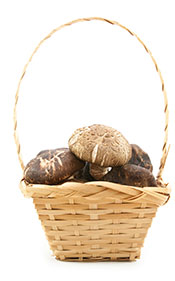
1. Potential Benefits For the Immune System
2. Shiitake Mushrooms Contain Anti-Cancer Compounds
3. Rich Source of Copper
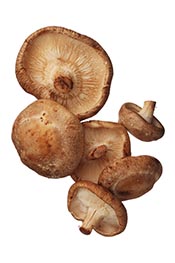
How Much Vitamin D Is In Shiitake Mushrooms?
5. They Have Anti-Inflammatory Properties
6. Anti-Bacterial Properties
7. Meaty (and Delicious) Taste
Types of Shiitake Mushrooms
Fresh
Dried
Powder and Pill Supplements
How To Use Shiitake Mushrooms in Cooking
How To Use Dried Shiitake Mushrooms
Final Thoughts

